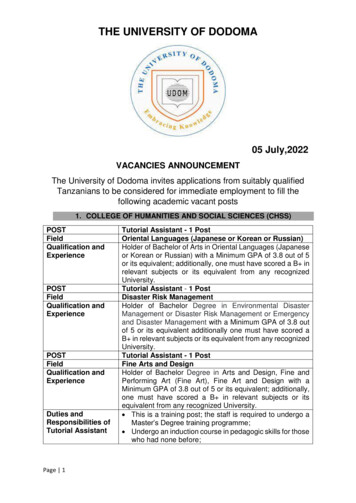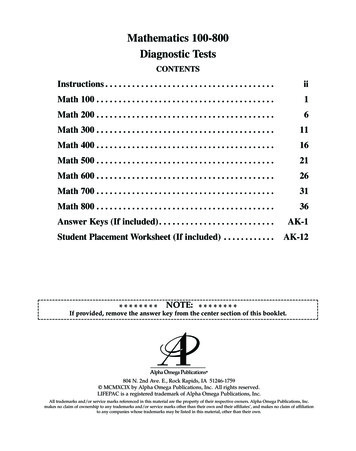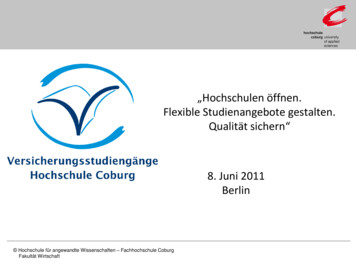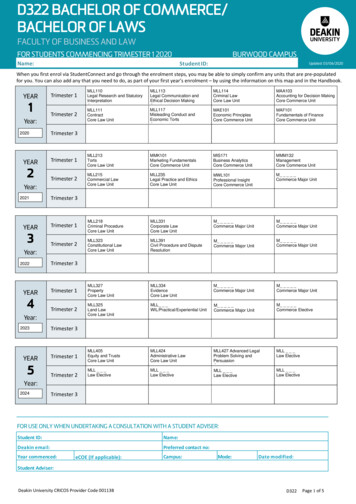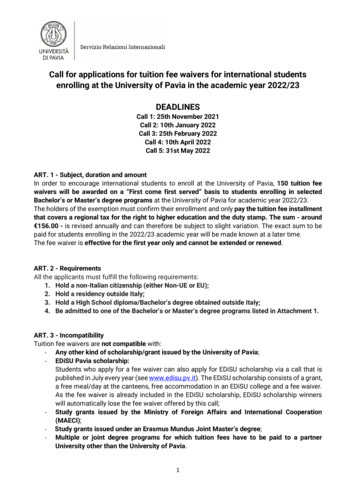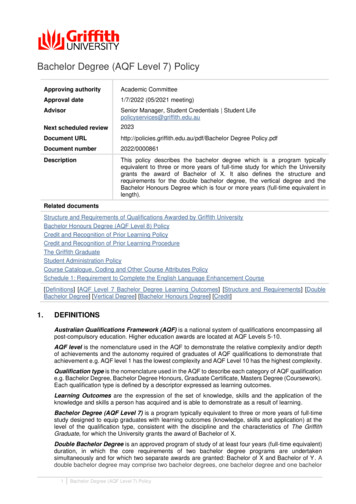
Transcription
Bachelor Degree (AQF Level 7) PolicyApproving authorityAcademic CommitteeApproval date1/7/2022 (05/2021 meeting)AdvisorSenior Manager, Student Credentials Student Lifepolicyservices@griffith.edu.auNext scheduled review2023Document URLhttp://policies.griffith.edu.au/pdf/Bachelor Degree Policy.pdfDocument number2022/0000861DescriptionThis policy describes the bachelor degree which is a program typicallyequivalent to three or more years of full-time study for which the Universitygrants the award of Bachelor of X. It also defines the structure andrequirements for the double bachelor degree, the vertical degree and theBachelor Honours Degree which is four or more years (full-time equivalent inlength).Related documentsStructure and Requirements of Qualifications Awarded by Griffith UniversityBachelor Honours Degree (AQF Level 8) PolicyCredit and Recognition of Prior Learning PolicyCredit and Recognition of Prior Learning ProcedureThe Griffith GraduateStudent Administration PolicyCourse Catalogue, Coding and Other Course Attributes PolicySchedule 1: Requirement to Complete the English Language Enhancement Course[Definitions] [AQF Level 7 Bachelor Degree Learning Outcomes] [Structure and Requirements] [DoubleBachelor Degree] [Vertical Degree] [Bachelor Honours Degree] [Credit]1.DEFINITIONSAustralian Qualifications Framework (AQF) is a national system of qualifications encompassing allpost-compulsory education. Higher education awards are located at AQF Levels 5-10.AQF level is the nomenclature used in the AQF to demonstrate the relative complexity and/or depthof achievements and the autonomy required of graduates of AQF qualifications to demonstrate thatachievement e.g. AQF level 1 has the lowest complexity and AQF Level 10 has the highest complexity.Qualification type is the nomenclature used in the AQF to describe each category of AQF qualificatione.g. Bachelor Degree, Bachelor Degree Honours, Graduate Certificate, Masters Degree (Coursework).Each qualification type is defined by a descriptor expressed as learning outcomes.Learning Outcomes are the expression of the set of knowledge, skills and the application of theknowledge and skills a person has acquired and is able to demonstrate as a result of learning.Bachelor Degree (AQF Level 7) is a program typically equivalent to three or more years of full-timestudy designed to equip graduates with learning outcomes (knowledge, skills and application) at thelevel of the qualification type, consistent with the discipline and the characteristics of The GriffithGraduate, for which the University grants the award of Bachelor of X.Double Bachelor Degree is an approved program of study of at least four years (full-time equivalent)duration, in which the core requirements of two bachelor degree programs are undertakensimultaneously and for which two separate awards are granted: Bachelor of X and Bachelor of Y. Adouble bachelor degree may comprise two bachelor degrees, one bachelor degree and one bachelor1Bachelor Degree (AQF Level 7) Policy
honours degree or two bachelor honours degrees. A Bachelor Honours Degree in a double bachelordegree is normally a concurrent honours degree. In a double bachelor degree the core requirementsof each degree are able to be satisfied in less time than is required to complete eachdegree separately,Bachelor Honours Degree (AQF Level 8) is typically equivalent to one year of full-time study,normally taken after the completion of a three year bachelor degree, referred to as “end-on honours”.The requirements for the end-on honours program are set out in the Bachelor Honours Degree (AQFLevel 8) Policy. For the Bachelor Honours Degree the University grants the award of the Bachelor ofX (Honours).A Bachelor Honours Degree (AQF Level 8) of four of more years in length may be studied concurrentlywith the bachelor degree, with the honours typically included in the final year/s of the program, referredto as “concurrent honours”. In a concurrent Bachelor Honours Degree there is no differentiated studyprogram and all students awarded the degree receive one award the Bachelor of X (Honours).The term "embedded honours" refers to the award of Honours on the basis of a differentiated studyprogram within a Bachelor degree (AQF Level 7) program which is four or more years (full-timeequivalent) in length. Students who meet specified admission criteria may apply to change programsto the AQF Level 8 Bachelor Honours Degree and on successful completion receive one award theBachelor of X (Honours).Courses in bachelor degrees are identified as core (including level 1, designated, capstone andEnglish language enhancement [ELE]), and elective (listed and free choice).Capstone Course is a core course which offers students nearing graduation the opportunity tosummarise, evaluate and integrate learning from across a range of learning experiences to engagewith a task which addresses a contemporary issue or problem facing a particular discipline orprofession.Vertical Degree is an approved program of study of at least four years (full-time equivalent) duration,in which the core requirements of a bachelor degree and a Masters degree program or a Bachelorhonours degree and masters are undertaken simultaneously and for which two separate awards aregranted: Bachelor of X and Master of Y. In a vertical degree the core requirements of each degree areable to be satisfied in less time than is required to complete each degree separately.2.AQF LEVEL 7 BACHELOR DEGREE LEARNING OUTCOMESThe Bachelor Degree is located at level 7 of the Australian Qualifications Framework (AQF). A Bachelordegree is designed and accredited to enable graduates to demonstrate the learning outcomesexpressed as knowledge, skills and the application of knowledge and skills specified in the AQF level7 criteria and the Bachelor Degree descriptor as set out below:2KnowledgeGraduates of a Bachelor Degree will have a broad and coherent body ofknowledge, with depth in the underlying principles and concepts in one or moredisciplines as a basis for independent lifelong learning.SkillsGraduates of a Bachelor Degree will have: cognitive skills to review critically, analyse, consolidate and synthesiseknowledge cognitive and technical skills to demonstrate a broad understanding ofknowledge with depth in some areas cognitive and creative skills to exercise critical thinking and judgement inidentifying and solving problems with intellectual independence communication skills to present a clear, coherent and independentexposition of knowledge and ideas.Bachelor Degree (AQF Level 7) Policy
Applicationofknowledgeand skillsGraduates of a Bachelor Degree will demonstrate the application of knowledgeand skills: with initiative and judgement in planning, problem solving and decisionmaking in professional practice and/or scholarship to adapt knowledge and skills in diverse contexts with responsibility and accountability for own learning and professionalpractice and in collaboration with others within broad parameters.In its planning and accreditation processes the University assures itself that every student undertakesa coherent program of study that supports the development of the learning outcomes specified for thebachelor degree, the discipline and The Griffith Graduate.3.STRUCTURE AND REQUIREMENTSIn accrediting a bachelor degree, the Programs Committee on the recommendation of the relevantGroup Board, establishes the award and the requirements that need to be attained for the conferral ofthe award. The requirements normally include one or more of the following: Core Courses Academic Plan/s Elective Courses Research component.These requirements in the bachelor degree vary depending on the purpose of the qualification in termsof broadening, extending or deepening the student’s existing knowledge and skills.3.1Core CoursesCore courses are mandatory for all students to successfully complete in order to meet the degreerequirements.3.1.1Level 1 CoursesEach program provides a common learning experience for commencing students, thedefault being 60CP core level 1 courses, to facilitate progression to a variety ofacademic plans that allow breadth and/or depth in learning outcomes.3.1.2Designated CoursesSome programs classify one or more of their core courses as designated courses asthe learning outcomes are critical to graduate competence and it is impractical for thestudent to continue in the program without meeting a satisfactory level of competence.A designated course is normally a performance-based or work integrated learningcourse or a course requiring the development of particular practical skills and/ordemonstration of certain personal qualities. A student may be eligible for exclusion onthe basis of failure in one or more designated courses. The designated courses arespecified in the program requirements and a schedule of designated courses ismaintained on the Programs and Courses website.3.1.3English Language Enhancement (ELE) CourseAn outcome of a Griffith bachelor degree is a graduate level of competency in Englishlanguage skills in writing, reading, speaking and listening. The English LanguageEnhancement (ELE) course is a core course and therefore a mandatory requirementfor all bachelor degree programs that enrol international students in first and secondyear unless the program restricts entry to students who are not required to completethe ELE course as specified in Schedule 1 to this policy. ELE course requirements arestipulated on the Programs and Courses website for the specific program.For those international students required to complete the ELE course, it is normally tobe undertaken within their first trimester of enrolment in the bachelor degree. Wherethe program is required to include an ELE course, the program structure must enablethe ELE course to be taken in any trimester/teaching period into which international3Bachelor Degree (AQF Level 7) Policy
students are first admitted. Program structures are to include the ELE course in amanner that enables students to complete the ELE course within the annual academicload for the program. Schedule 1 specifies which students are required to completethe ELE course.Students who are native speakers of English are not permitted to enrol in the ELEcourse. Domestic students for whom English is not their first language, may enrol inthe ELE course as one of their free choice electives.3.2Academic PlansWithin the program requirements a set of courses that develop a particular academic theme areidentified and designated as an academic plan. There are two designated types of academicplans available within the Bachelor Degree: Major (60CP). Minor (40CP).The program requirements may specify the completion of a prescribed academic plan or aminimum number of academic plans to be completed from a range available within the program.3.2.1A Prescribed Academic PlanWhere the degree structure includes a prescribed academic plan, the prescribed planmust include at least 60 CP of courses at level 2 or higher which comprise a sequenceof courses that develop a coherent academic theme culminating in advanced levelcourses. At least 20 CP of courses in the prescribed plan must be at final year level(level 3 or above) and one of those courses may be designated as a capstone coursefor either the degree or for the academic plan. The prescribed academic plan isincluded on the testamur.In addition to the prescribed academic plan, the program may include other academicplans from which the student may select in order to complete the degree requirements.3.2.2A Range of Academic PlansWhere the degree structure offers students a choice of academic plans and there isno prescribed academic plan:3.2.3 The academic plans will have one or more designated types. The preferred plantype for bachelor degrees is the major (60CP) which is included on the testamur.However other plan types may be used, alone or in combination. A major must include at least 60 CP of courses at level 2 or higher which comprisea sequence of courses that develop a coherent academic theme culminating inadvanced level courses. At least 20 CP of courses in the major must be at finalyear level (level 3 or above) and one of those courses may be designated as acapstone course. Level 1 courses may be designated as foundation courses fora major, but are not included in the requirements for the major. The majority of courses in a major will be unique to that major and not shared withother majors. (This condition is consistent with the requirement for a coherentsequence of courses). Where a plan type other than major is used, at least some of the plans must satisfythe conditions prescribed for a major, and students must be required to completeat least one academic plan of at least 60 CP.Other Academic Plan Provisions – MinorsA bachelor degree may include academic plans, Minors, which include 40CP ofcourses.The degree requirements may permit or require students to undertake more than oneacademic plan.3.2.4Inclusion of Majors (60CP) on the TestamurA student may be awarded the bachelor degree with a maximum of two majors.4Bachelor Degree (AQF Level 7) Policy
3.3Elective CoursesElectives are either: listed electives - a set of courses specified in the requirements of a program or an academicplan from which students are required to choose a specified number to fulfil the requirementsof the program or plan; or free choice electives - students are permitted to select a number of courses which are notspecified in the program or plan requirements in order to fulfil the requirements of theprogram or plan.Where the program requirements permit a student to undertake free choice elective courses,the student may select any course from within the University provided that:3.4 the course is an undergraduate course; and the program requirements concerning the maximum number of credit points at particularcourse levels (e.g. level 1, 2 etc.) are complied with; and pre-requisite and co-requisite conditions are satisfied; and the course is not a restricted course; or in the case of a restricted course, the student meets the conditions specified in therestrictions, or is given approval by the Head of School or nominee to undertake the course.Research ComponentWithin the requirements of a program a course or set of courses that include as learningoutcomes the capacity to plan, execute and report on the findings of a research project may bedesignated as a research component.3.4.1Bachelor DegreeIn the Bachelor Degree, courses with learning outcomes requiring students todemonstrate their ability to collate research and findings on a particular topic, to applytheir knowledge in analysing this information and incorporating it into a writtenresponse meet the research component requirement.3.4.2Bachelor Honours DegreeIn a four or more year Bachelor Honours Degree a significant research component isrequired including at least 30 CP of supervised research leading to a dissertation or acomparable activity in the visual, performing or creative arts. The research componentmay also include research preparation courses, supervised reading courses, andcolloquia, which are assessed. To be eligible for scholarships and admission to apostgraduate research qualification completion of a research component of at least40CP which may include a research methodology course equivalent to 10CP isrequired. See Higher Degree Research Scholarship Policy.3.5Degree RequirementsEach bachelor degree has a set of requirements specific to it, within the following generalframework.To be eligible for the award of the Bachelor degree, the student will have successfully completed240 credit points (CP) in the case of a three year degree, or 320CP in the case of a four yeardegree, including:5 all courses specified as being core and therefore mandatory for the award including level 1courses, designated courses, capstone course and the ELE course; where applicable, one or more academic plans, selected from the set of academic plansapproved for inclusion in the degree structure, with the number of academic plans to becompleted specified; where applicable, the specified number of credit points to be taken as electives; where applicable the specified number of credit points to be taken as a research component; where applicable, other requirements, such as field experience, employment experience;Bachelor Degree (AQF Level 7) Policy
3.6 no more than 100CP at level 1 for a three year program or 120CP at level 1 for a four yearsingle degree program; and at least 60CP of courses at level 3 or above.Awarding the Bachelor Degree (AQF Level 7) with DistinctionThe Bachelor degree (AQF Level 7) may be awarded with distinction where a student achievesa minimum program GPA of 6.5 with no failed courses. Additional criteria may be included withthe approval of the Programs Committee. The wording ‘with distinction’ will not form part of theaward title. The words ‘This award was achieved with Distinction’ are recorded on the testamur.4.DOUBLE BACHELOR DEGREEA double bachelor degree has the following characteristics: the core requirements and learning outcomes of each single degree including any professionalregistration requirements must be effectively satisfied within the structure of the double degree,and its total credit point value; the minimum requirements of a double degree include:ocore courses specified in the single degree;oan academic plan, other than a minor, in the form specified in the single degree;oa research component (where the double includes a Bachelor Honours degree); elective requirements may be met by the requirements of the other degree; the minimum duration of a double degree will be as follows:o for a combination of two single degrees of three years duration (240CP) the minimum durationof the double degree shall be (320CP);o for a combination of two single degrees where either single degree is greater than three yearsduration the minimum duration of the double degree shall be (400CP); the courses to be undertaken within the double degree will normally be taught and assessed inEnglish, regardless of the partner institution's language of instruction; two awards are conferred on the successful completion of a double degree; under certain circumstances, a student may be permitted to transfer from the double degreeprogram to one of the single degree programs.Proposals to establish double degrees will be approved by the Deputy Vice Chancellor (Education).Proposals for double degrees to be offered in conjunction with an international partner will beconsidered in accordance with the Procedure for Planning, Developing and Approving TransnationalPrograms. In establishing double degrees the Programs Committee shall take into account thecomparability and equivalence of the learning outcomes, the volume of learning, the balance oflearning, the program of study including content, and learning and assessment approaches.5.VERTICAL DEGREEA vertical degree has the following characteristics: the core requirements and learning outcomes of each single degree including the researchcomponent and any professional registration requirements must be effectively satisfied within thestructure of the vertical degree; elective requirements will be met by the requirements of the other degree; the minimum duration of a vertical degree shall be four years or part time equivalent (320CP); two awards are conferred on the successful completion of the vertical degree.6Bachelor Degree (AQF Level 7) Policy
Progression to the Masters component of the vertical degree may require a specified level ofachievement. Such requirements shall be specified for each vertical degree program. Where a studentdoes not meet the specified level of achievement or does not wish to complete the Masters degreecomponent they may be permitted to transfer from the vertical degree program to an equivalentbachelor degree program.Proposals to establish vertical degrees will be approved by the Deputy Vice Chancellor (Education).In establishing vertical degrees the Programs Committee shall take into account the comparability andequivalence of the learning outcomes, the volume of learning, the balance of learning, the program ofstudy including content, and learning and assessment approaches.6.BACHELOR HONOURS DEGREE (AQF LEVEL 8)This section refers to Bachelor Honours degree programs which are four or more years in length(concurrent and embedded Honours). Refer to Bachelor Honours Degree Policy for end-on honoursprograms which are an additional year of full-time study following the completion of a three or moreyear bachelor program.6.1Structure of the Honours ProgramThe award of Honours in a four year program is based on meritorious performance across thewhole program or a defined sub-set of the program including a research component weightedat 30CP or more. Students eligible for the award of Bachelor Honours Degree (AQF Level 8)may undertake a concurrent honours program or may be required to undertake a differentiatedprogram in the final year/s of a Bachelor Degree (AQF Level 7) program. Where a differentiatedprogram is required for the Bachelor Honours Degree, the credit points required in thedifferentiated program should normally be the same as the credit points for the standard (nonHonours) program.6.2AdmissionWhere the award of Honours is based on a differentiated program, the criterion for admissionfor the Bachelor Honours Degree (AQF Level 8) shall be based on an average level ofperformance of at least a GPA of 5.0 in a specified set of courses taken in the program up to thepoint of entry to the Honours program.6.3AssessmentThe coursework component of the Bachelor Honours Degree (AQF Level 8) shall be subject tothe same provisions as the Bachelor degree (AQF Level 7). The organisation, supervision andassessment of the research component including the dissertation shall be subject to the sameprovisions which apply to Honours programs involving an additional year of study (refer toBachelor Honours Degree Policy).6.4Honours ClassificationThe classes of Honours degrees awarded in concurrent honours will be Class I, Class IIA,Class IIB and Class III. In embedded honours the classes of Honours degrees awarded will beClass I, Class IIA, and Class IIB. In specific programs, Programs Committee may approve onlythe award of unclassified Honours where this is the established norm in the profession.The relevant Program Director recommends the Honours classification for each candidate to theDean (Learning & Teaching) for approval via the School Assessment Board.Students may appeal against their honours classification in accordance with the Student Reviewand Appeals Policy and Procedures.The Dean (Learning & Teaching) is responsible for approving candidates for the award of theUniversity Medal, under the terms of the University Medal Policy.7Bachelor Degree (AQF Level 7) Policy
7.CREDITUnder the Credit and Recognition of Prior Learning Policy and Procedure credit may be grantedtowards the requirements of a bachelor degree on the basis of the level of the prior study and the levelof the award program. The Credit and Recognition of Prior Learning Procedure describes the types ofcredit and limitations on credit. The credit and recognition of prior learning provisions specifically forbachelor degrees (AQF Level 7) are as follows:7.1Maximum Amount of CreditFor Bachelor degrees where the program is three or more years of full-time study or equivalent,the maximum amount of credit which may be granted is two-thirds of the program. In grantingcredit consideration needs to be given to the balance of the components of the program at thebachelor degree level (AQF 7) and the program’s learning outcomes.7.2Minimum Requirements for the Award of the DegreeNotwithstanding the amount of credit which may be granted towards a bachelor degree as setout in 7.1 above, the student undertaking a three year degree (240CP) is required to completea minimum of 80 credit points of level 2 and 3 courses which are part of the degree requirements*and which have not been credited towards another award. In the case of a four year bachelordegree (320CP), the requirement is 110 credit points at level 2, 3 and 4. For bachelor degreesof other lengths, the application of this rule relates to the minimum portion of the program forwhich credit may not be granted according to 7.1 above and requires that these courses mustnot be level 1 courses which are part of the degree requirements* and which have not beencredited towards another award.* The degree requirements of the Griffith degree which the student is undertaking.7.3Advanced Standing, Articulation Pathways and Structured UpgradingThe Credit and Recognition of Prior Learning Policy prescribes the conditions under whichprovisions for advanced standing, articulation pathways and structured upgrading may beapproved in bachelor degrees.7.4Guidelines for credit and recognition of prior learning in bachelor degrees are as follows:Where the bachelor degree provides for electives, unspecified credit may be granted on thebasis of prior study at Diploma level or higher. Table 1 sets out the maximum amount ofunspecified credit which may be granted on the basis of study at the level indicated, providedthat the bachelor degree has sufficient free choice electives to accommodate the credit. In thiscase, the prior study may be in an area unrelated to the area of the bachelor degree.Where the prior study is relevant to the bachelor degree, specified credit can be granted forparticular course(s) in the bachelor degree on the grounds that the student has substantiallycompleted the content of the course. Table 1 sets out the standard amount of credit (specifiedand unspecified combined) which is granted in this case.The maximum amount of credit (specified and unspecified combined) set out in Table 1 is onlygranted where the prior study is considered to have such a high degree of overlap to the contentof the bachelor degree, that program structure requirements can be met by the completion ofthe minimum amount of further study.Regardless of the amount of credit indicated in Table 1, the conditions of section 7.2 must besatisfied.The amount of credit awarded may not be greater than the amount of study successfullycompleted at the same or lower level (expressed as Griffith equivalent credit points) on whichthe award of credit is based.8Bachelor Degree (AQF Level 7) Policy
Table 1: Guidelines for Amount of CreditMaximum CP ofUnspecifiedCreditStandard CP ofcredit (specifiedand unspecifiedcombined)Maximum CP ofcredit (specifiedand unspecifiedcombined)102020NIL (0)8080AQF Level 6 AdvancedDiploma80120160AQF Level 6 AssociateDegree80120160AQF Level 7 Bachelordegree80160160 or as in 6.2Level of Prior StudyAQF Level 5-7Undergraduate CertificateAQF Level 5 DiplomaNo credit will be awarded for studies completed at Certificate I and II levels.Credit for studies completed at Certificate III and IV level may be granted where the assessedlearning outcomes are judged to be equally acceptable within the structure of the Universityaward.Where Certificate III and IV studies have been completed as part of a Diploma program, creditwill be awarded on the basis of partial completion of Diploma studies. Refer to the Credit andRecognition of Prior Learning Procedure for more information.Courses undertaken in programs within the University which may formally articulate with thebachelor degree may be counted towards satisfying the requirements of the degree. Thesearrangements are not limited by the restrictions on the amount of credit which may be grantedas set out above.9Bachelor Degree (AQF Level 7) Policy
e.g. Bachelor Degree, Bachelor Degree Honours, Graduate Certificate, Masters Degree (Coursework). Each qualification type is defined by a descriptor expressed as learning outcomes. . in which the core requirements of two bachelor degree programs are undertaken simultaneously and for which two separate awards are granted: Bachelor of X and .



